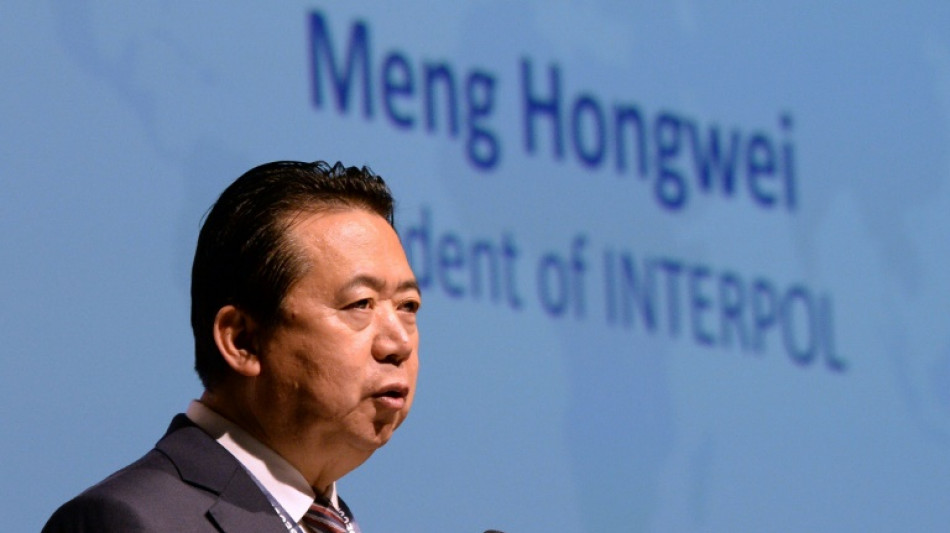

The big fish caught in Xi Jinping's anti-graft net
A state TV series documenting high-profile officials caught in President Xi Jinping's purge of the Communist Party's upper echelons has captivated millions in China and renewed focus on widespread abuses of power.
The former head of Interpol, an ex-spy chief and a Xinjiang governor accused of "trading power for sex" are just some of the cadres to suffer spectacular falls from grace.
Ostensibly a crackdown on corruption, critics say the wide-ranging campaign has also served to remove those voicing criticism of the all-powerful leader.
Here are some of the political heavyweights caught in Xi's anti-graft net.
Vice minister Sun Lijun
Former deputy public security minister Sun Lijun oversaw security in Hong Kong during months of unrest in 2019.
He was sacked and expelled from the Communist Party for allegedly taking bribes, manipulating the stock market, illegally possessing firearms and paying for sex, and charged this month.
This week's TV programme featured a "confession" by Sun in which he admitted to receiving a series of bribes worth $14 million, hidden inside boxes of what appeared to be seafood.
Executed banker Lai Xiaomin
The former chairman of Huarong -- one of China's largest state-controlled asset management firms -- Lai Xiaomin was executed in January 2021 for receiving "extremely large" bribes.
A court in the city of Tianjin ruled that the former Communist Party member had used his position to obtain $260 million in bribes. It also found him guilty of embezzlement and bigamy, less than a month before his execution.
High-flyer Bo Xilai
Son of a high-ranking revolutionary general and a political high-flyer tipped for China's future leadership, Bo Xilai was sentenced to life in jail for bribery in 2013, amid a murder scandal involving his wife and the death of a British businessman.
Charismatic Bo, 72, had exposed deep splits in the party before Xi took power in 2012.
He was party chief of the southwestern metropolis of Chongqing when murder allegations against his wife Gu Kailai burst into the open.
Bo was stripped of his position and convicted of bribery, embezzlement and abuse of power, and his wife was handed a death sentence for murder -- later commuted to life imprisonment.
Security chief Zhou Yongkang
Former spy chief Zhou Yongkang was convicted of a series of corruption charges -- including bribery, abuse of power and leaking state secrets -- and jailed for life in 2015.
Until his fall from grace, Zhou, 79 -- who started off as an oil field technician -- was one of the nine most senior politicians in China.
China's former top cop Fu Zhenghua -- who is thought to have led the corruption investigation into Zhou -- was later swept up in the corruption drive and investigated for graft.
Interpol chief Meng Hongwei
Then-Interpol chief Meng Hongwei was sentenced to more than 13 years in prison for bribery in January 2020, in a case that shook the international police organisation.
He vanished during a 2018 visit to China from France, where he was based as the body's first Chinese president, and later pleaded guilty to accepting $2.1 million in bribes.
During his tenure as deputy chief of China's public security bureau, the agency arrested and interrogated a number of prominent Chinese dissidents -- including Nobel Peace Prize laureate Liu Xiaobo, who later died of cancer while in police custody.
State news agency Xinhua said in December that authorities are now preparing a corruption case against Meng's wife, Grace Meng.
'Big Cannon' Ren Zhiqiang
Property tycoon Ren Zhiqiang was given 18 years in 2020 for corruption and embezzlement, after he penned an essay that lambasted Xi's response to the coronavirus pandemic.
The son of a former commerce minister, Ren was known for his outspokenness, which earned him the nickname "Big Cannon". In his essay criticising Xi, he called the president a "clown".
Xinjiang chief Nur Bekri
One of China's highest-ranking Uyghur officials and the former head of the troubled northwestern Xinjiang region, Nur Bekri was jailed for life in 2019.
He pleaded guilty to accepting 79 million yuan ($11.6 million) in bribes over the course of two decades and "trading power for sex", according to a Chinese court.
Bekri's tenure in Xinjiang was marred by violence, including bloody anti-Chinese riots in 2009 that left nearly 200 dead.
L.Sabbadin--IM



